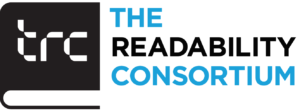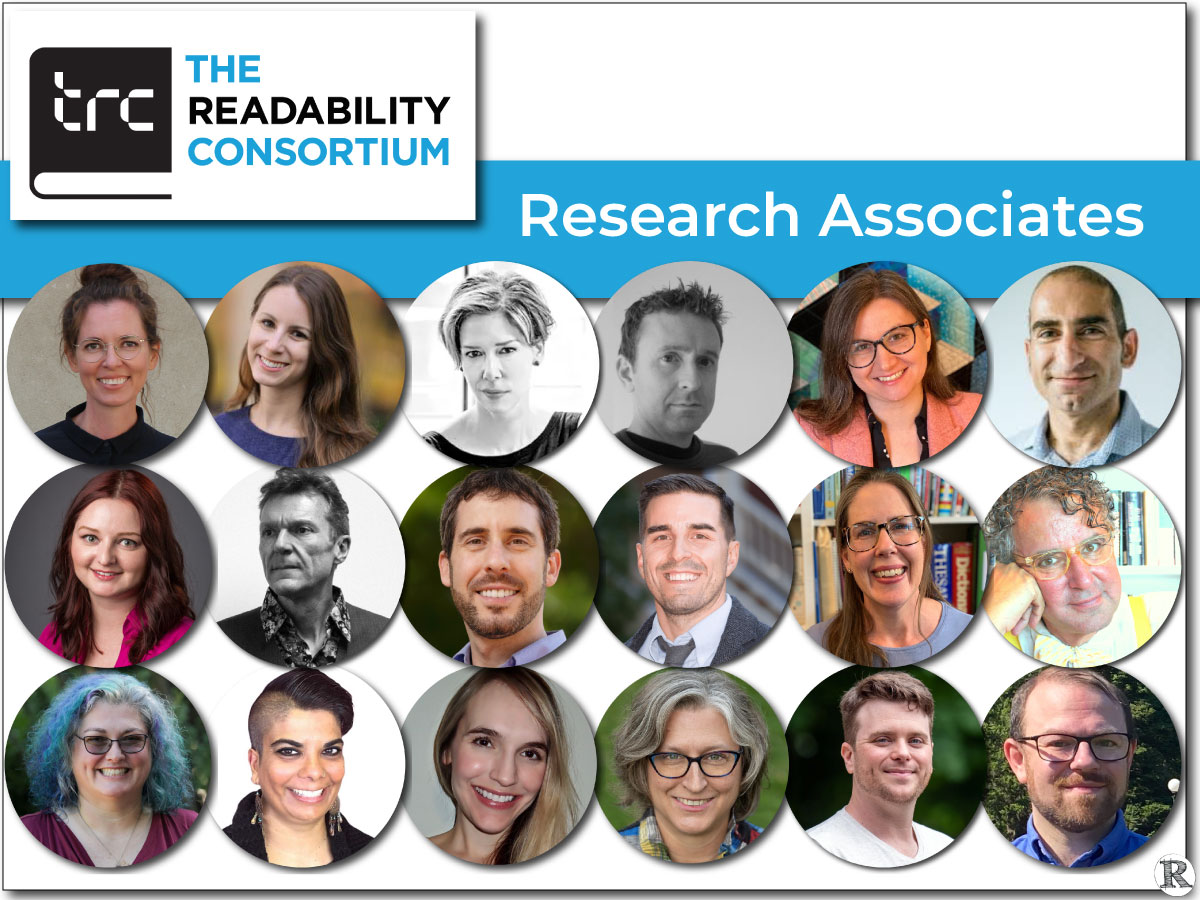Leading experts join TRC to advance reading effectiveness and outcomes
The Readability Consortium (TRC) continues to grow with the recent addition of six new Research Associates, bringing the total to 18 distinguished experts. Representing diverse fields—including education, cognitive science, human-computer interaction, linguistics, technology, and typography—these associates bring a rich array of perspectives to advance the Consortium’s mission.
This expanded team enhances TRC’s ability to explore new insights and foster interdisciplinary collaboration. Their expertise strengthens the Consortium’s research aimed at improving readability for a wide range of readers, from students and knowledge workers to everyday users.
Each new Associate contributes unique knowledge and expertise that deepens the consortium’s understanding of readability and its real-world impact. Collectively, they advance the Consortium’s work toward a future where information is tailored and more accessible, enhancing reading outcomes for all.
Meet the researchers who are driving this important work:
Sofie Beier, PhD, Royal Danish Academy, Denmark, is a graphic designer and professor who leads the Centre for Visibility Design. She authored the “Type Tricks” series and “Reading Letters.” Her research focuses on how typefaces affect reading and using eye-tracking to optimize typographic layouts for individual readers. (https://royaldanishacademy.com/en/profile/1016)
Jenae Cohn, PhD, UC Berkeley, is the Executive Director of the Center for Teaching and Learning. Her research and publications emphasize supporting engaged, mindful reading in digital learning environments. As a researcher, she explores digital literacy, student experiences with online learning, and reading and writing across the curriculum. (https://www.jenaecohn.net/)
Jocelyn Dueck, PhD, Carnegie Mellon University, is an Assistant Professor of Collaborative Arts and has a distinguished record of achievement as a practitioner in linguistics, music, and language translation. She is a subject matter expert in prosody and related auditory coding and data structure. Her recent work involves analyzing spoken language fluency during read-aloud tasks. (http://www.jocelyndueck.com/)
Bernard Kerr, Principal UX Designer, is a UX designer with extensive experience at Adobe and Microsoft. His work in information design and data visualization has supported critical readability research and helped lay the foundations for The Readability Consortium and The Virtual Readability Laboratory. (https://thereadabilityconsortium.org/community/)
Anna Kosovicheva, PhD, University of Toronto, Mississauga, Canada, is an Assistant Professor of Psychology and co-director of the Applied Perception & Psychophysics Laboratory (APPLY) Group. She studies visual perception, focusing on spatial vision and eye movements, with applications in readability and individual differences that impact real-world scenarios, including digital readability and visual impairments. (https://applylab.org/index.html)
Gerry Leonidas, University of Reading, United Kingdom, is a Professor of Typography; he specializes in typeface design with a focus on cross-script typography and the design processes for diverse languages. His deep knowledge of typographic traditions and archival materials informs his teaching and research, shaping the future of type design. He is a past President of ATypI, and co-founder of ISTVC and the Granshan Foundation. (https://leonidas.net/)
Joanna Lewis, PhD, University of Northern Colorado, integrates research on visual attention, technology distraction, and education, with a focus on readability and digital literacy. She explores how individualized typography can improve math operations and digital literacy, especially benefiting first-generation students. (https://www.unco.edu/cebs/psychological-sciences/about-us/faculty-staff/lewis-joanna.aspx)
Bruno Maag, Dalton Maag Ltd., is a renowned typographer whose career has spanned leading innovations in font technology and design. Known for his work on custom fonts for major global brands, his more recent interest in typographic accessibility and the neurological aspects of reading has positioned him as an advocate for inclusive design. (https://www.daltonmaag.com/)
Dave Miller, PhD, Tufts University, earned his doctorate from Stanford University, studying human-computer moral conflict and interaction with partially automated systems. He has taught at Cornell and led research on reading performance at UCF. His work spans persuasive interface design, human factors consulting, and injury risk reduction in various industries. (https://engineering.tufts.edu/me/people/faculty/dave-miller)
Joe Nese, PhD, University of Oregon, is an expert in behavioral assessment and educational psychology, focusing on innovative tools for measuring reading progress in educational settings. He is the Co-PI of the ISLA Project and the PI of CORE and CORE + Prosody, initiatives aimed at developing a computerized assessment system for oral reading fluency. (https://www.linkedin.com/in/joe-nese/)
Susanne Nobles, PhD, ReadWorks, is Chief Academic Officer at the edtech nonprofit dedicated to supporting K-12 teachers in fostering successful readers. She has spent her career empowering educators with research and tools for effective learning and is an active collaborator on several readability studies. (https://about.readworks.org/our-team.html)
Denis Pelli, PhD, New York University, is a Professor of Psychology and Neural Science. He has made groundbreaking contributions to characterizing the limits of visual perception, particularly in reading, and in letter and object recognition. His development of the widely used Pelli-Robson Contrast Sensitivity Chart is just one example of his pioneering work in the field. (https://as.nyu.edu/faculty/denis-pelli.html)
Shelley Rodrigo, PhD, University of Arizona, researches how emerging technologies facilitate communication, particularly in teaching and learning. She is a leader in the Writing Program at the University of Arizona and an influential voice in digital literacy. (https://english.arizona.edu/person/shelley-rodrigo)
Sunaina Shenoy, PhD, University of New Mexico, specializes in bilingual special education and dyslexia assessment, focusing on early identification of reading difficulties in diverse populations. She collaborates on international studies, including readability research in India, ensuring cultural relevance in reading materials. (https://coehs.unm.edu/faculty-staff/profiles/shenoy-sunaina.html)
Shannon Sheppard, PhD, University of Washington, is a cognitive scientist researching language and reading comprehension. She leads interdisciplinary research at the CRANIAL Lab, exploring how the brain processes written and spoken language to improve comprehension outcomes. (https://www.linkedin.com/in/mackenzieshannon/)
Jen Vanek, PhD, EdTech Center@World Education, is a researcher and educator focused on digital literacy, online learning, and adult English language education. She leads field tests of Adobe’s Liquid Mode, enhancing PDF readability on mobile devices. Her work informs education policy, teacher training, and technology use for adult literacy. (https://www.linkedin.com/in/jvanek/)
Shaun Wallace, PhD, University of Rhode Island, is an Assistant Professor of Computer Science with over 15 years of experience in Human-Computer Interaction and Software Engineering. He is the co-founder of the Virtual Readability Lab. He has developed public research systems that have attracted hundreds of thousands of users, enhancing their reading and information-seeking behaviors. (shaunwallace.org)
Ben Wolfe, PhD, University of Toronto, Mississauga, Canada, is an Assistant Professor of Psychology at the University of Toronto. His lab focuses on use-inspired vision science research in a range of topics, including the visual affordances of readability, and he leads a research team that brings key insights from vision science to questions in readability. Wolfe is an expert in visual information acquisition and has twenty years’ experience in vision science research. (https://applylab.org/index.html)
 About The Readability Consortium: The Readability Consortium is housed at The University of Central Florida Research Foundation and is guided by a board of industry and nonprofit members.
About The Readability Consortium: The Readability Consortium is housed at The University of Central Florida Research Foundation and is guided by a board of industry and nonprofit members.
TRC is actively engaging with new potential members and collaborators, and is interested in conversations with aligned stakeholders actively working to redefine the future of readability interface, e.g., document design, consumer electronics, healthcare, cybersecurity, finance, mixed reality, and beyond.
Learn more about the TRC Research Associates here: https://thereadabilityconsortium.org/community/




